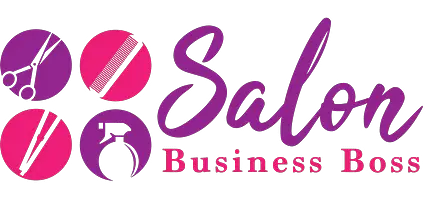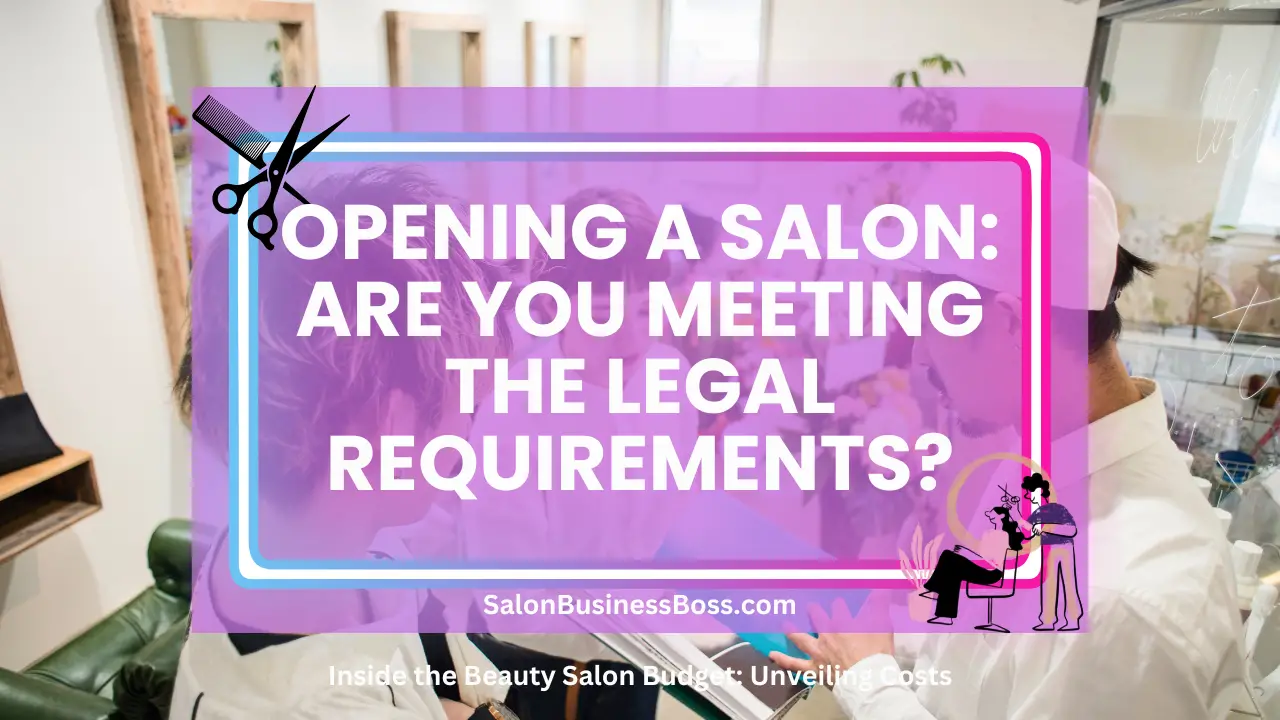Opening a salon can be an exciting and rewarding venture for aspiring entrepreneurs in the beauty and grooming industry. However, before embarking on this journey, it’s crucial to understand and fulfill the various legal requirements and obtain the necessary licenses and permits.
Requirements for opening a salon include obtaining licenses such as cosmetology, esthetician, and nail technician licenses. Additionally, health department permits, insurance coverage, and compliance with building regulations and zoning are crucial. Environmental and employment regulations must be considered too. Ensure ADA accessibility to cater to all clients.
1. Business Structure and Registration:

The first and most fundamental step in establishing a successful salon business is to determine the most appropriate business structure. Each option—sole proprietorship, partnership, LLC, or corporation—holds distinct advantages and legal implications, making the selection of utmost importance as it directly impacts the salon’s future.
Sole proprietorship is the simplest and most common option for small businesses. In this structure, a single individual owns and operates the salon, assuming all profits and liabilities. It requires minimal paperwork and offers complete control over the business. However, personal assets are at risk in case of legal disputes or debts.
Partnerships involve two or more individuals pooling resources and expertise to run the salon. This structure shares profits and responsibilities among partners, enabling a wider range of skills and financial support. However, disagreements and shared liabilities may arise, so a well-drafted partnership agreement is crucial.
Limited Liability Company (LLC) is a popular choice as it provides limited liability protection to its owners, separating personal and business assets. It offers a flexible management structure and allows for pass-through taxation, making it advantageous for many entrepreneurs.
On the other hand, incorporating the salon as a corporation establishes a separate legal entity, shielding owners from personal liability. Corporations have complex compliance requirements but can attract external investment and enjoy various tax benefits.
Once the business structure is chosen, registration with the appropriate authorities is essential. This involves formally registering the salon’s business name with the local government or county clerk’s office. Additionally, if the salon plans to hire employees, an Employer Identification Number (EIN) must be obtained from the IRS for tax purposes.
Read more about: Mane Attraction: The Price of Starting a Hair Business
2. Salon Licensing:
Obtaining the necessary licenses is a critical aspect of running a salon. The specific licenses required may vary depending on your location and the services you intend to offer. Common licenses include:
a. Cosmetology License
A cosmetology license is a crucial requirement for any salon that offers a wide range of beauty services, including hair, nails, and skincare treatments. Obtaining this license ensures that salon owners and their employees are adequately trained and skilled in providing professional beauty services to clients.
To acquire a cosmetology license, individuals must first complete a state-approved training program. These programs cover various aspects of cosmetology, such as hair cutting, styling, coloring, nail care, skincare, and sanitation practices. After completing the training, aspiring cosmetologists must pass a comprehensive licensing exam to demonstrate their competency.
Having a cosmetology license not only complies with legal regulations but also instills confidence in clients, as it indicates that the salon’s staff is well-trained and qualified to deliver quality beauty services. It also opens doors to a broader range of career opportunities for beauty professionals in the competitive salon industry.
b. Esthetician License
An esthetician license is an essential requirement for salons that focus on skincare and facial treatments. Estheticians specialize in providing various skincare services, such as facials, exfoliations, waxing, and other non-medical treatments that enhance the skin’s appearance and health.
To obtain an esthetician license, individuals must complete specialized training focused on skincare techniques, products, and client consultation. The training also covers the importance of maintaining proper hygiene and following industry-standard practices.
Following the completion of the esthetician training program, candidates must pass a licensing examination. This exam assesses their knowledge, practical skills, and ability to perform various skincare procedures safely and effectively.
Holding an esthetician license assures clients that the salon employs skilled professionals who are well-versed in addressing various skincare concerns. It also opens up opportunities for estheticians to work in medical spas, luxury resorts, or even start their own skincare businesses.
c. Nail Technician License
For salons that offer nail services such as manicures and pedicures, obtaining a nail technician license is imperative. Nail technicians specialize in providing nail care services and beautifying clients’ hands and feet.
To acquire a nail technician license, individuals must complete a designated training program specifically focused on nail care techniques, nail art, sanitation, and safety practices. The training ensures that candidates have a comprehensive understanding of nail health and hygiene.
Upon completing the training program, aspiring nail technicians are required to pass a state licensing exam. This exam evaluates their practical skills and theoretical knowledge in providing safe and hygienic nail services.
Having a nail technician license demonstrates the salon’s commitment to maintaining high standards of hygiene and professionalism in nail services. It also reassures clients that their nail care is in the hands of skilled and qualified technicians, encouraging repeat business and positive word-of-mouth referrals.
d. Massage Therapy License

For salons offering massage services, licensed massage therapists are a necessity. Massage therapy involves the manipulation of soft tissues to promote relaxation, alleviate pain, and improve overall well-being.
To become a licensed massage therapist, individuals must complete a comprehensive massage therapy program that covers anatomy, physiology, various massage techniques, and ethical considerations related to client care. This training equips therapists with the knowledge and skills necessary to deliver effective and safe massage treatments.
After completing the massage therapy program, candidates must pass a licensure exam to become a licensed massage therapist. The exam evaluates their proficiency in various massage techniques and their understanding of the ethical and legal aspects of massage therapy.
Having licensed massage therapists in a salon ensures that clients receive professional and therapeutic massage treatments. It also helps build trust and credibility with clients, encouraging them to return for regular massages and refer others to the salon’s services.
Read more about: Beauty services that don’t require a license
3. Salon Permits:
In addition to licenses, you may need various permits to operate a salon legally. These permits can cover health, safety, building regulations, and more. Some common permits include:
a. Health Department Permit
The health department permit is a crucial requirement for salons that offer services involving close contact with clients, such as haircuts, facials, and massages. This permit ensures that the salon complies with strict sanitation and hygiene standards, creating a safe environment for both clients and staff.
Health inspections are typically conducted by local health authorities to assess the salon’s compliance with cleanliness and safety practices. Inspectors check for proper disinfection of tools, equipment, and workstations, as well as the use of disposable items where necessary. Adequate sanitation of towels, linens, and robes is also crucial in maintaining a hygienic setting.
Having a valid health department permit not only demonstrates the salon’s commitment to client well-being but also builds trust and confidence among customers. Clients are more likely to return to a salon where their health and safety are prioritized, leading to increased customer loyalty and positive reviews.
b. Building and Zoning Permits
When planning to construct or renovate a salon’s physical space, obtaining building and zoning permits from the local government is essential. These permits ensure that the salon’s establishment adheres to safety codes and complies with zoning regulations set by the city or municipality.
Building permits are necessary to verify that the proposed construction or renovation plans meet building codes, structural requirements, and safety standards. This helps to prevent potential hazards and ensures the salon’s infrastructure is sound.
Zoning permits are crucial in ensuring that the salon’s location aligns with the designated zoning laws of the area. It verifies that the business is operating in a zone appropriate for commercial use and does not violate any zoning restrictions.
Complying with building and zoning regulations not only keeps the salon legally compliant but also helps avoid penalties and legal issues that could arise from non-compliance. It also demonstrates the salon’s commitment to maintaining a safe and appropriate space for its clients and employees.
c. Fire Safety Permit
Obtaining a fire safety permit is imperative to ensure that the salon meets all fire safety standards set by local authorities. This permit ensures that the salon is adequately prepared to prevent and handle fire emergencies, providing a secure environment for clients and staff.
Salons are required to have appropriate fire safety measures in place, such as fire extinguishers, smoke detectors, and fire exits. The salon’s layout and design must allow for easy evacuation in case of a fire emergency.
By acquiring a fire safety permit, the salon demonstrates its commitment to prioritizing the safety of everyone on the premises. It also reassures clients that the salon has taken necessary precautions to mitigate fire-related risks, creating a sense of trust and security.
d. Signage Permit

If the salon plans to display signage, such as a storefront sign or promotional banners, a signage permit may be required from the city or municipality. This permit ensures that the signage complies with local regulations, including size limitations, placement, and aesthetics.
Having a signage permit is vital as it prevents the salon from facing fines or penalties for non-compliance with sign regulations. It also ensures that the salon’s signage aligns with the city’s overall aesthetic and does not negatively impact the surrounding environment.
Well-designed and properly permitted signage can attract more customers to the salon and enhance its visibility in the local community. It serves as an effective marketing tool, conveying the salon’s brand and services to potential clients passing by.
Read more about: Navigating the Regulatory Landscape: Requirements to Open a Hair Salon
4. Insurance Coverage:
Securing comprehensive insurance coverage is crucial to protect your salon business from potential liabilities. Salon owners should consider the following insurance policies:
a. General Liability Insurance
General liability insurance is a crucial safeguard for salon owners against potential accidents and injuries that may occur on the salon premises. It provides coverage for incidents such as slip and fall accidents, property damage, and bodily injuries sustained by clients or visitors while at the salon.
In the fast-paced environment of a salon, accidents can happen unexpectedly, making general liability insurance a vital protection. For instance, if a client slips on a wet floor or sustains an injury from falling salon equipment, this insurance would cover their medical expenses and any legal liabilities the salon may face.
Having general liability insurance not only offers financial protection but also instills confidence in clients and employees alike. It demonstrates the salon’s commitment to ensuring a safe environment for everyone on the premises. Moreover, it shields the salon’s assets from potential lawsuits, preserving the business’s financial stability and reputation.
b. Professional Liability Insurance
Professional liability insurance, also known as “errors and omissions” insurance, is tailored to protect salon owners and staff from claims of professional negligence or malpractice. This coverage is specifically designed to handle situations where clients allege that the salon’s services or advice caused them financial or physical harm.
In a salon setting, mistakes can occasionally happen, and client expectations may not always align with the final results. Professional liability insurance steps in to cover legal expenses, settlements, and judgments that may arise from such claims. For instance, if a client alleges that a hair dye treatment caused an allergic reaction or unsatisfactory results, this insurance would provide protection.
Having professional liability insurance is crucial for maintaining the salon’s credibility and reputation. It gives clients confidence that the salon is dedicated to delivering high-quality services and resolving any potential disputes professionally. This insurance acts as a safety net, ensuring that even in challenging situations, the salon can continue to operate without crippling financial consequences.
c. Property Insurance
Property insurance offers comprehensive coverage for physical damage to the salon’s building, contents, and equipment resulting from fire, theft, vandalism, or natural disasters. Salon owners invest significant resources in building and outfitting their establishments, making property insurance a vital asset for protecting their assets.
In the event of an unforeseen catastrophe, such as a fire or flood, property insurance provides financial support to repair or replace damaged property and equipment. It alleviates the financial burden and allows the salon to resume operations swiftly.
By having property insurance, salon owners can have peace of mind knowing that their investments are safeguarded. It allows them to focus on running their business, knowing that they have a safety net in place in case of any unforeseen property-related incidents.
d. Workers’ Compensation Insurance

If a salon plans to hire employees, workers’ compensation insurance is mandatory in most states. This insurance provides coverage for medical expenses, rehabilitation costs, and lost wages for employees who suffer work-related injuries or illnesses.
In a salon setting, employees may face various risks, such as slips, trips, and repetitive motion injuries. Workers’ compensation insurance ensures that employees receive necessary medical care and financial support if they experience any job-related injuries or health issues.
By providing workers’ compensation coverage, salon owners demonstrate their commitment to the well-being of their employees. It also protects the salon from potential lawsuits and legal liabilities related to workplace injuries. Compliance with workers’ compensation laws is crucial to maintain a positive work environment and foster a strong employer-employee relationship.
Read more about: Hair Salon Insurance Cost: Factors, Coverage, and Implications
5. Environmental Regulations:
Salons play a significant role in the beauty industry, using various chemicals and beauty products to provide their services. However, these products can have environmental impacts if not handled and disposed of properly. Complying with environmental regulations is crucial to mitigate the salon’s ecological footprint and protect the environment.
Salon owners must be aware of local and federal regulations regarding the use and disposal of chemicals, dyes, and other beauty products. This may involve obtaining permits related to waste disposal and implementing environmentally friendly practices, such as using eco-friendly products and recycling waste materials.
By adhering to environmental regulations, salons demonstrate their commitment to sustainability and responsible business practices. Eco-conscious clients are increasingly choosing businesses that prioritize environmental stewardship, making environmental compliance a vital aspect of attracting and retaining customers.
6. Employment Regulations:
When hiring employees for your salon, it’s essential to be well-versed in labor laws and employment regulations. These laws govern various aspects of the employer-employee relationship, such as minimum wage, overtime pay, working hours, and employee rights.
Salon owners must ensure compliance with labor laws to avoid legal issues and protect the rights of their employees. This includes providing fair wages, proper working hours, and adhering to rules related to breaks and overtime pay.
Creating a fair and compliant work environment is crucial for employee satisfaction and retention. Complying with employment regulations fosters a positive workplace culture, which can lead to increased employee loyalty and productivity.
7. Accessibility Compliance:
Ensuring accessibility for individuals with disabilities is not only a moral imperative but also a legal requirement in many jurisdictions. Compliance with the Americans with Disabilities Act (ADA) ensures that your salon is accessible to all clients, regardless of their physical abilities.
Salon owners must take measures to remove physical barriers that may impede access for individuals with disabilities. This includes providing ramps, elevators, and accessible restrooms. Moreover, the salon’s website and promotional materials should be designed to accommodate individuals with visual or hearing impairments.
By embracing accessibility compliance, salons demonstrate inclusivity and respect for diversity. Clients with disabilities are more likely to choose businesses that are accessible and accommodating, leading to a broader customer base and increased loyalty.
Conclusion
Opening a salon requires careful consideration of various legal requirements, licensing, permits, and insurance coverage. By diligently adhering to these essential steps, you can establish a legally compliant and thriving salon business. Remember to research and understand the specific regulations and requirements in your local area, as they may vary. With thorough preparation and attention to detail, your salon can become a haven for beauty and self-care while staying compliant with the law.
Frequently Asked Questions

1. Why do I need workers’ compensation insurance?
Workers’ compensation insurance is mandatory if you hire employees. It covers medical expenses and lost wages in case of employee injuries on the job.
2. Are there environmental regulations to follow?
Yes, salons using chemicals and beauty products must comply with environmental regulations, including proper handling and disposal of these products.
3. What is ADA accessibility compliance, and why is it essential?
ADA accessibility compliance ensures your salon is accessible to individuals with disabilities, promoting inclusivity and avoiding legal issues related to discrimination.
To learn more on how to start you own salon checkout my startup documents here.
Please note that the contents of this blog are for informational and entertainment purposes only and should not be construed as legal advice. Any action taken based on the information provided in this blog is solely at your own risk. Additionally, all images used in this blog are generated under the CC0 license of Creative Commons, which means they are free to use for any purpose without attribution.

About the author. Entrepreneur and Salon Business Fan.
Hi! I am Shawn and I am a happy individual who happens to be an entrepreneur. I have owned several types of businesses in my life from a coffee shop to an import and export business to an online review business plus a few more and now I create online salon business resources for those interested in starting new ventures. It’s demanding work but I love it. I do it for those passionate about their business and their goals. That’s why when I meet a salon business owner, I see myself. I know how hard the struggle is to retain clients, find good employees and keep the business growing all while trying to stay competitive.
That’s why I created Salon Business Boss: I want to help salon business owners like you build a thriving business that brings you endless joy and supports your ideal lifestyle.

